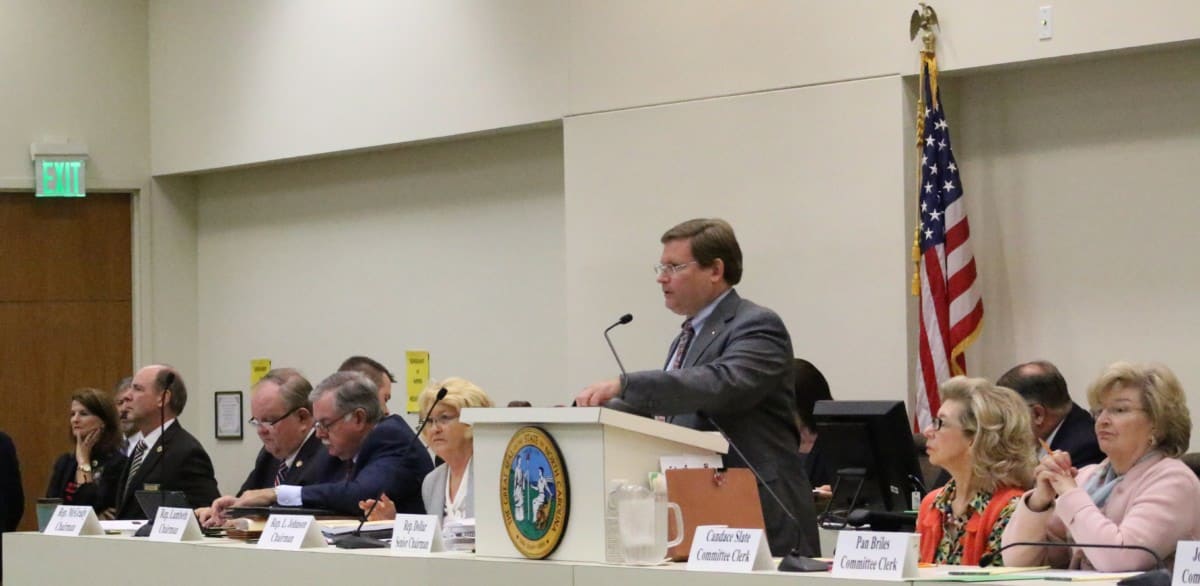The full House Appropriations Committee capped off the education budget yesterday by announcing additions that include increased teacher and principal pay.
Rep. Craig Horn, R-Union, presented to the committee on the education budget — a revision of the budget passed during last year’s long session — saying that teachers would receive an average 4.1 percent increase with the goal of getting North Carolina’s average salary to $50,000 in two years. He said the salary increase should move the state to 39th in the National Education Association’s rankings.
“Although this is still nowhere near our goal, it is a dramatic step forward from when we were 46th in the nation, just a few short years ago,” Horn said.
North Carolina is currently estimated by the NEA to be 41st in teacher pay, down from 42nd last year. We reported on that yesterday.
Earlier in the meeting, Rep. Nelson Dollar, R-Wake, said the teacher salary plan would also make the state more competitive with other states in the Southeast. Horn said the salary plan would make North Carolina second in the Southeast, just behind Georgia.
There is some question as to both of these ranking assertions, however. According to the NEA’s rankings for 2014-15, Virginia, Kentucky and Georgia — Southeastern states — all exceed $50,000 in average teacher salaries. And according to a budget highlights document, the 39th place NEA ranking North Carolina aspires to assumes that no other states give raises in fiscal years 2015-16 or 2016-17. Horn admitted during the Committee meeting that rankings could change depending on whether other states decide to implement teacher pay raises in those years.
And in a phone call last night, Horn admitted his mistake when it comes to the impact of the salary raises on the state’s rankings in the Southeast.
“I misspoke, and I was caught,” he said, adding later, “I’m embarrassed about it.”
But he also said that teacher pay wasn’t the only issue House lawmakers were concerned with.
“What made us different than the Governor is that we also felt an obligation to all the state employees, not only teachers,” he said.
The House granted a 2 percent pay raise to other state employees in its budget and a $500 one-time bonus. Governor Pat McCrory’s budget proposal, on the other hand, called for a one-time bonus of an average 3 percent for state employees as well as raises in positions that are hard to fill.

While the teacher salary proposal from the House is an average 4.1 percent increase, salary boosts will vary depending on how much experience a teacher has. Horn pointed out that teacher raises the last few years have focused on beginning teachers. This one will not. Teachers in their first five years will not receive a raise, but will get a $1,000 bonus. Teachers with 25 or more years of experience will get a 2 percent raise and a $1,000 bonus. The bigger raises will go to teachers in between those two extremes. Horn said that depending on the teacher and the years of experience, some individual teachers moving tiers on the salary schedule could see as much as a 15 percent boost in pay.
The House salary proposal for principals and assistant principals is less ambitious. All steps on the principal and assistant principal salary schedule will go up by 2 percent. Those administrators not getting a step increase will receive a $500 bonus.
There is a provision in the budget authorizing a Joint Legislative Study Committee on School-Based Administrator Pay, including the possibility of revising the administrator salary schedule. We reported on the severe problems with the administrator salary schedule last year.
The budget items we reported on from the House Education Apppropriations Committee last week remain mostly intact in the budget bill discussed today.
That includes the provision to change the controversial A-F grading scale to make it based on a score of 50 percent school growth and 50 percent school achievement, as opposed to the current ratio of 80/20 in favor of achievement.
“Education is growth and that is why we’ve made that change,” Horn said.
The budget includes the 137-percent increase in funding for special education opportunity scholarships hammered out in the House Education Appropriations Committee last week.
One change from the budget introduced in the House Education Appropriations Committee is a reduction in the amount of money going to the Principal Preparation Program, which was slated to receive $8.5 million to get going. An amendment reducing that amount by $1 million and using the money instead for medical scholarships at UNC passed during the full House Appropriations Committee meeting Tuesday.
On the overall budget, Dollar, who is the House Appropriations Committee Senior Chairman, gave his praise.
“This is a responsible budget that funds critical needs,” he said.
The House Appropriations Committee gave a favorable report to the revised budget yesterday. It will be up for a vote by the full House today.
Recommended reading




